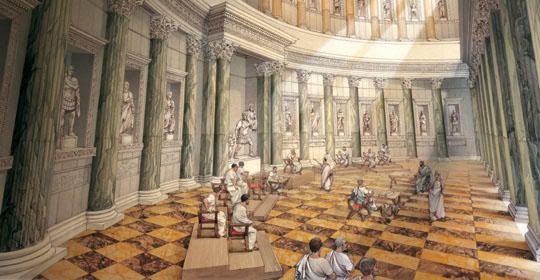I call it, among other things, "A practomimetic introduction to Roman culture through the Latin language." It's an RPG--a tabletop RPG at the moment, but with dreams of going digital some day. It's about a possibly-mythical, possibly-real object called the Lapis Saeculorum (Stone of Ages), which bears an inscription that the students have been recruited to decipher.
In order to do that they must:
- Travel back in time through the imaginative energies harnessed by the Demiurge (aka their teacher; aka, on Wednesday, me);
- Learn Latin, because of course the inscription is in Latin.
- Learn enough about Roman culture to understand what the inscription means.
Wednesday is the Classical Association of Connecticut's State Latin Day, an amazing occasion when north of a thousand Latin students wear their tunicae (they can't have the fun otherwise) and run around a camp-like setting that has, of course, a piscina. I've been going faithfully for the last few years with my XBox or laptop in tow, trying to spread the word that games are not the devil, especially when viewed through classics.
The students, taking time away from such things as sunning themselves and racing chariots, have always been appreciative (and they have to do a certain number of enriching things over the course of their day, so being able to use video games for that purpose seems appealing, I imagine). But I've always seen a sort of longing in their eyes: "Isn't there a way," their eyes say, "that we could actually play games to learn Latin?"
"Ita vero, Marce, est ludus Latinus."
Six Romans, played by any number of Latin students in a team format, arrive on a road outside Pompeii, where a group of brigands is looking menacingly into a tree.
Six Romans, cousins--but each with a distinct worldview and a distinct set of skills. Three young women and three young men. One admires the Republic, another the Caesars; a third just wants peace. One knows of the power of Rome's legions; another of the power of the ancient cultural heritage that has come to Rome from the Greek world. Each has a different ars linguae ("speech skill") with which to start, and will gain more artes as the students level him or her up.
Six Romans who may have very different ideas about the empire and the old republic, but who must work together through the Demiurge's Texto-Spatio-Temporal Transport System to carry out the mission of OPERATION LAPIS SAECULORUM.
Some of my co-conspirators and I are working on this practomime on Google Wave, along with a similar practomime for Ancient Greek that will embed the first levels of that language in my large lecture courses on Greek Civilization and Classical Mythology. If you'd like to come along and help reimagine classics learning, let me know!

